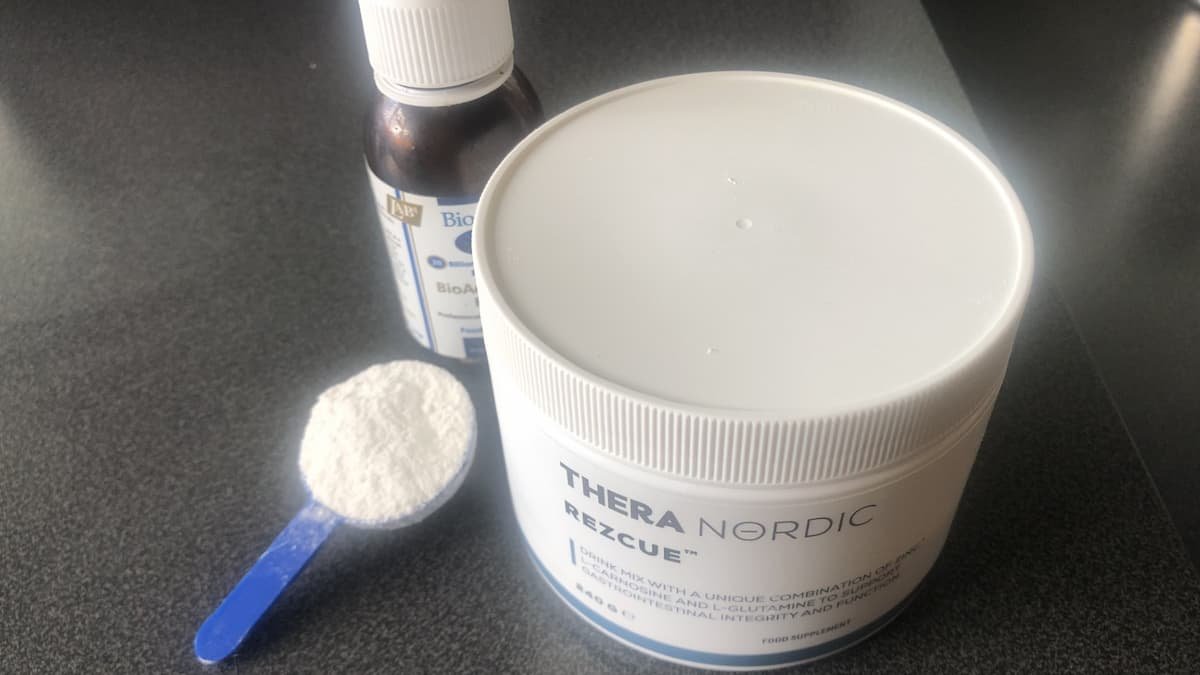Endurance running demands peak physical performance and mental fortitude, but what happens when the body’s digestive system starts to rebel?
For many endurance runners, navigating digestive issues can be a challenging aspect of training and racing. These issues can often be caused by leaky gut or to use the more ‘scientific name’ increased gut permeability.
- Cramps
- Diarrhea
- Constipation
- Bloating
- Gas
- Acid reflux
- Heartburn
- nausea
These issues can be detrimental to performance and dampen the joy of running. In this blog, we’ll delve into these digestive issues in endurance runners and look at practical ways we can reduce or even avoid them.
Endurance running places significant stress on the body, and the gastrointestinal system is certainly no exception.
The repetitive impact of each stride, coupled with the body’s redistribution of blood flow to working muscles, can lead to a host of digestive problems.
During prolonged endurance exercise, blow flow is redirected from the gastrointestinal tract to working muscles and the heart and lungs. This leads to reduced blood flow to the gut.
Reduced blood flow to the gut can cause increased permeability, known as ‘Leaky Gut’.
A leaky Gut is a chief cause of some of the digestive symptoms experienced by endurance runners.
Please read my blog giving further information on Leaky Gut in Endurance Athletes

Common Digestive Issues Experienced by Endurance Runners
- Stomach Cramps: Sharp, stabbing pains in the abdomen can strike runners mid-stride, often attributed to reduced blood flow to the intestines, which is heavily linked to a leaky gut and the jostling motion of running.
- Bloating and Gas: Swallowing air while breathing heavily during runs, as well as the consumption of certain foods high in fermentable carbohydrates, can lead to bloating and excessive gas. Another cause of bloating and excessive gas can be due to an imbalance of bacteria in the gut leading to dysbiosis in the gastrointestinal tract. This can lead to an increase in inflammation which can cause diarrhea, constipation, and further digestive problems.
- Runner’s Trots: Perhaps the most dreaded digestive issues among runners, runner’s trots manifest as urgent, uncontrollable bowel movements during or after runs, often accompanied by diarrhea. Many top athletes including the likes of Brendan Foster have suffered from this condition. Again, this is often linked to Leaky Gut caused by a lack of blood flow to the intestines.
- Nausea, acid reflux, heartburn: Intense exertion and hormonal changes can trigger epigastric problems. Like lower gut problems, endurance running can reduce blow flow to the stomach which can cause a rise in inflammation, often leading to symptoms such as nausea and heartburn. Intense exercise can also lead to an increase in stomach acid production, coupled with the fact that the action of endurance running leads to an increase in intra-abdominal pressure, this can be a recipe for heartburn and acid reflux!

How Can Digestive Problems In Endurance Runners Be Managed?
- Mindful Nutrition: Choose easily digestible, low-fiber foods before runs, such as bananas, toast, or oatmeal. Experiment with different foods during training to identify triggers and develop a pre-run nutrition plan.
- Hydration Habits: Maintain proper hydration before, during, and after runs to support digestion and prevent dehydration, which can exacerbate digestive issues. Sip fluids regularly rather than gulping large volumes at once.
- Improve Your Gut Health: This is really important in the long term. Although before run/races you generally would be better consuming low residue foods. Your overall diet should contain adequate fiber to feed the good bacteria in your gut. It is also important to limit sugary snacks and drinks as this feeds the pathogenic bacteria and yeasts in the gut which can lead to leaky gut before we even add the impact of running to our compromised digestive system. Focus your carbohydrate intake on high-fiber options e.g. brown rice, oats, sweet potatoes, quinoa, lentils etc. Also, increase your intake of prebiotics. These act as fertilisers for your good bacteria and include; onions, garlic, leeks, bananas, oats, avocado, artichoke, and sourdough bread.
- Experiment and Adapt: What works for one runner may not work for another. Be open to experimenting with different nutrition and hydration approaches during training to find what works best for you. This is why I never mention the timeframe of having a meal before your race or training as in my experience this is highly individual.
- Seek Professional Guidance: If digestive issues persist or significantly impact your running performance, consult with a Sports Nutritionist or Healthcare Professional for personalised advice and potential medical evaluation.

Supplements to Help Reduce Digestive Problems Often Caused by Leaky Gut in Endurance Runners
- Probiotics – Supplementing with probiotics is a great way to strengthen the mucosal barrier and therefore help prevent leaky gut. With so many probiotics on the market, it is important to use one of high quality. This probiotic by BioCare is of an excellent standard. Feel free to use my discount code P7891 when ordering. You can also learn more by reading my blog on probiotics
- Prebiotics – Prebiotics are available in food but also in supplement form. When using them, start slowly as initially, they can exacerbate symptoms until your gut becomes used to the product. PHGG is a good option as it is certified low FODMAP, meaning it is less likely to cause unwanted side effects such as gas and bloating. This prebiotic supplement by Myota is an excellent, well-researched option, with its main ingredient being PHGG, meaning it works well for sensitive digestive systems. Use my discount code ULTIMATE20 for a 20% discount when ordering.
- Saccromyces Boulardii – This is a ‘friendly yeast’ that has shown positive effects on gut barrier function. It is well studied, showing beneficial effects on the restoration and preservation of the gut lining, again helping reduce the occurrence of leaky gut. You can order a good quality Saccharomyces boulardii supplement, from Cytoplan. Please feel free to use my discount code CYT35104-35-10 when ordering.
- Bovine Colostrum – This is the milk that comes from cows the first few days after giving birth. Its beneficial effects come from the number of antibodies it contains, which is around 100 times more than what is found in standard cow’s milk. A systematic review of studies on the Influence of Bovine Colostrum on Leaky Gut Syndrome in Athletes found that supplementation with Bovine Colostrum helps to reverse gut permeability in athletes.
- L-Glutamine – L-glutamine is a non-essential amino acid, meaning our body can produce it. However, a caveat to this is that it’s considered ‘conditionally essential’. This means during high amounts of stress (e.g. intense endurance exercise), the consumption of L-Glutamine by the small intestine exceeds it’s rate of production! We know intense endurance exercise causes leaky gut, therefore supplementing with L-glutamine can help reduce this breakdown, reducing gut permeability.
- Zinc Carnosine – This is a molecular complex consisting of the mineral Zinc and L-carnosine, which is a molecule made up of two amino acids. The mechanism of action of zinc carnosine is that it provides a sustained release of zinc in the gastrointestinal tract. The reason why zinc carnosine is supposedly more beneficial than zinc alone is that the chelation of zinc with L-carnosine protects the zinc from degradation, ensuring it is effectively delivered to the target tissues. A study found that zinc carnosine helps stabilise gut mucosa by maintaining the integrity of the gut barrier. There is a fantastic supplement available that offers the unique combination of both L-Glutamine and Zinc-Carnosine called Rezcue, which has been developed to help repair leaky gut. Click on Rezcue Drink Powder to order, and use my code JONATHANCARTER for a 20% discount.
- Licorice Root – This is a supplement often used to treat upper gut issues, such as heartburn, acid reflux, gastritis, and stomach ulcers. Various studies have shown licorice root’s protective benefits against these issues. It is thought to work by increasing mucus production in the stomach, which is your stomach’s natural defence against corrosive agents like stomach acid.
This is just an overview of digestive issues in endurance athletes.
If you want to get to the bottom of your digestive issues and or want to optimise your performance it is best to Consult with a Sports Nutritionist or healthcare professional, who can help tailor strategies to optimise gut health and performance based on individual needs and goals.
As a competitive endurance runner myself I work with athletes as a Sports Nutritionist on a holistic basis.
An example of this could be a client presenting gut-related symptoms, which means I will then look at their diet, to establish if this is negatively impacting gut health and if needed use cutting-edge technology via stool testing from Invivo Healthcare or Genova Diagnostics, to get to the root cause of their digestive problems.
I will then work with the client to put a protocol in place to improve their gut health and therefore performance.
I will sometimes use the ‘4 Rs Approach’. For more information on this please click the link. This will combine a mixture of dietary changes and supplementation to help heal the gut.
This approach can work well for those with Leaky Gut.

Take Home Message
Digestive issues are an unfortunate reality for many endurance runners, but they don’t have to derail your training or race goals.
By understanding the causes of digestive discomfort and implementing targeted strategies to manage them, runners can minimise the impact on their performance.








